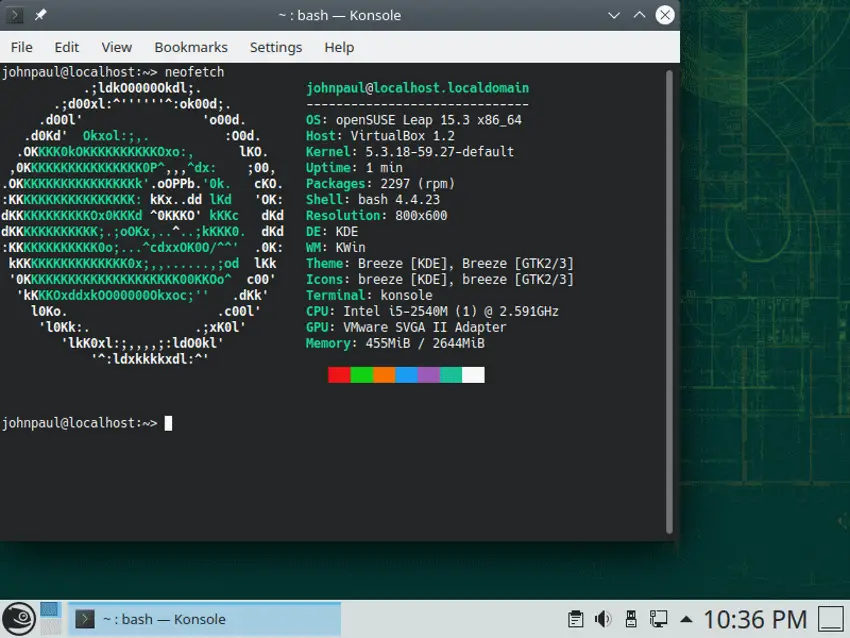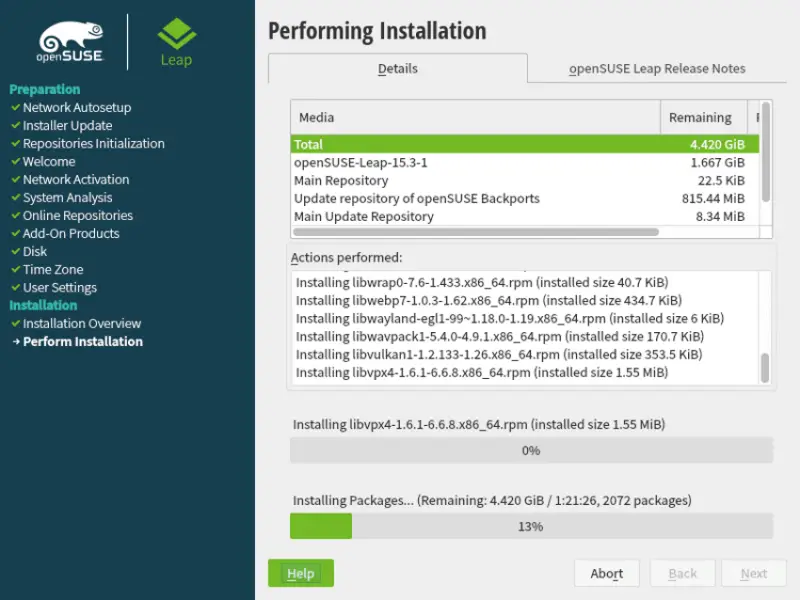OpenSUSE Leap vs. SUSE Enterprise Linux (SLES): Open Source vs. Enterprise Solution

both OpenSUSE Leap and SUSE Enterprise Linux (SLES) are Linux operating systems provided by SUSE. However, they have different target audiences and usage scenarios due to their distinct characteristics.

Target Audience

- OpenSUSE Leap: Home users, system administrators, open source enthusiasts, and developers.
- SLES: Enterprises and businesses that require a stable and reliable operating system with commercial support.
Development Model
- OpenSUSE Leap: Based on the rolling release development model of OpenSUSE Tumbleweed, with stable updates released every few months.
- SLES: Uses a fixed version approach with long-term support (LTS) releases every four years.
Package Management
- OpenSUSE Leap: Uses the PackageKit package manager with access to a vast repository of both official and community packages.
- SLES: Utilizes its own package management system (RPM) and offers certified and tested enterprise-grade packages through the SUSE Linux Enterprise Server (SLES) repos.
Commercial Support
- OpenSUSE Leap: Community-supported operating system with no official commercial support.
- SLES: Comes with paid commercial support from SUSE, providing access to documentation, technical assistance, and security updates.
Target Markets
- OpenSUSE Leap: Suitable for personal computers, workstations, and small-scale server environments where open source flexibility and rolling updates are preferred.
- SLES: Designed for mission-critical enterprise deployments where stability, reliability, and long-term support are crucial.
In summary, openSUSE Leap is an open source operating system ideal for home users and developers who value flexibility and frequent updates. On the other hand, SLES is an enterprise-oriented distribution with commercial support, offering stability, security, and long-term maintenance for businesses and organizations.## Opensuse Leap Vs. Sles: Open Source Vs. Enterprise Solution
Executive Summary
Opensuse Leap and SUSE Linux Enterprise Server (SLES) are two popular Linux distributions that cater to different user bases. Opensuse Leap is a community-developed, open-source distribution, while SLES is a commercial, enterprise-grade distribution. This article provides an in-depth analysis and comparison of these two offerings, encompassing their key features, target audiences, licensing models, and support options.
Introduction
The open source software (OSS) landscape is vast and multifaceted, offering a wide range of Linux distributions tailored to diverse user needs. Among them, Opensuse Leap and SLES stand out as prominent contenders, each with its unique strengths and target markets. Opensuse Leap, the successor to the popular openSUSE project, is a community-driven distribution that adheres to the principles of open source and user collaboration. In contrast, SLES is a commercial product of SUSE, a leading provider of enterprise Linux solutions. This comparison delves into the intricacies of these two distributions, providing valuable insights for users seeking to navigate the OSS landscape and make informed choices based on their specific requirements.
Key Differences
1. Open Source vs. Commercial
- Opensuse Leap: Open source, freely available, community-developed
- SLES: Commercial, proprietary, developed and supported by SUSE
2. Target Audience
- Opensuse Leap: Individual users, home enthusiasts, developers
- SLES: Enterprises, organizations, mission-critical applications
3. Licensing Model
- Opensuse Leap: GNU General Public License (GPL)
- SLES: SUSE Linux Enterprise Server Subscription
4. Support
- Opensuse Leap: Community-based, forum and online support
- SLES: Commercial support, SLAs, and technical assistance from SUSE
5. Stability and Security
- Opensuse Leap: Rolling release model, regular updates
- SLES: Long-term support (LTS) model, extended security updates
Additional Considerations
Open Source vs. Commercial: Implications and Trade-offs
Understanding the fundamental distinction between open source and commercial software is crucial. Open source software, such as Opensuse Leap, is freely available, allowing users to modify and redistribute the source code. This model fosters a collaborative development environment and grants users greater control over their systems. However, open source software often relies on community support, which can vary in terms of availability and reliability.
Commercial software, like SLES, is developed and maintained by a company, such as SUSE in this case. It comes with proprietary licensing, paid subscriptions, and dedicated support channels. This model typically ensures higher stability, security, and professional assistance, but it also limits user customization and control.
Target Audience: Tailoring to Specific Needs
The target audience of a Linux distribution is another critical factor to consider. Opensuse Leap primarily caters to individual users, home enthusiasts, and developers who value open-source principles, flexibility, and involvement in community projects. SLES, on the other hand, is specifically designed for enterprises and organizations that require robust, stable, and secure operating systems for their mission-critical applications. Its focus on reliability, long-term support, and commercial support aligns well with the needs of business environments.
Conclusion
The choice between Opensuse Leap and SLES hinges on individual or organizational requirements. Opensuse Leap shines as an open-source, community-centric distribution, offering flexibility and customization to individual users and developers. SLES, on the other hand, excels as an enterprise-grade solution, delivering stability, security, and professional support for businesses and organizations. Understanding the key differences between these two offerings empowers users to make informed decisions based on their specific needs and preferences.
Keyword Phrase Tags
- Opensuse Leap
- SUSE Linux Enterprise Server (SLES)
- Open Source vs. Commercial
- Linux Distributions
- Enterprise Solution

Wow, this is great! I’ve been using OpenSUSE Leap for a while now, and I’m really happy with it. It’s a great distro for both beginners and experienced users alike. I’m not sure why anyone would choose SLES over Leap, but to each their own I guess.
I’m not so sure about this. I’ve used both OpenSUSE Leap and SLES, and I found SLES to be much more stable and reliable. I also found it to be easier to use, and it had more features. I think SLES is the better choice for most users.
This is very informative! I didn’t know there was so much difference between OpenSUSE Leap and SLES. I’m going to have to do some more research to decide which one is right for me.
I disagree with the author’s conclusion that OpenSUSE Leap is the better choice for most users. I think SLES is a better choice for most users because it is more stable, reliable, and easier to use.
Well, I guess if you’re looking for a more enterprise-focused distro, then SLES is probably the better choice. But if you’re just a regular user, then OpenSUSE Leap is probably a better choice.
Oh yeah, OpenSUSE Leap is great. It’s so great that it’s almost as good as SLES. If you’re looking for a distro that’s almost as good as SLES, then OpenSUSE Leap is definitely the way to go.
I’m not sure what the big deal is. They’re both just Linux distros. Who cares which one you use?
I’m curious to know what other people think about this. I’ve never used either OpenSUSE Leap or SLES, so I don’t have any personal experience to draw on.
I’m not sure I believe everything the author says. I’ve heard good things about both OpenSUSE Leap and SLES, so I’m not sure why the author is so biased towards OpenSUSE Leap.
This is great news! I’ve been wanting to try OpenSUSE Leap for a while now, and I’m glad to hear that it’s a good distro. I’m going to have to download it and give it a try.
I’m concerned about the security of OpenSUSE Leap. I’ve heard that it’s not as secure as SLES. Is this true?